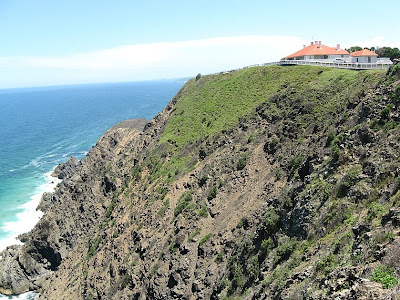[By the way, has there ever been a more annoyingly complicated tent design devised than the now strangely popular dome style? To fully secure the thing in all its variations seems to take an extraordinary number of pegs. At least it didn't leak. Much.]
Anyhow, apart from time at the local beach and in the shopping centres to escape the midday heat, we had a nice day trip from our just-over-the-border location to view Byron Bay: a first time for me, despite it only being a couple of hundred km from Brisbane.
It was a beautiful day, and the views from the cape are great. Here's the view south:

And north:
 The lighthouse itself:
The lighthouse itself:
 A view showing the lighthouse keeper's quarters (part of which you can actually stay overnight in, although I was told you have to book a long way ahead):
A view showing the lighthouse keeper's quarters (part of which you can actually stay overnight in, although I was told you have to book a long way ahead): However, be warned. Normal holiday traffic in Byron Bay is every bit as bad as they say. The one road into town slowed down to about 10 - 20 kph from about 8km out. Nice place to visit for a day: not sure I want to stay longer.
However, be warned. Normal holiday traffic in Byron Bay is every bit as bad as they say. The one road into town slowed down to about 10 - 20 kph from about 8km out. Nice place to visit for a day: not sure I want to stay longer.On another day, we made a short trip up to Springbrook in the Gold Coast hinterland. Purling Brook Falls is an under-appreciated, easy to access waterfall (the photo is not great, but you get the idea. If you squint, you might be able to make out the viewing platform up and to the left of the top of the falls. They are pretty high.):

Here's my favourite shot: an unusual looking bug (a type of dragonfly perhaps?) found on the path near the falls:

Lovely.
Another first: eating at a Nepalese restaurant, the Kathmandu Kitchen at Kingscliff. It is just the right kind of restaurant- a BYO with main meals in a very acceptable price range, friendly family service, and delicious food. Very highly recommended.
Must spend some more time on the far north coast of New South Wales, even though I still say that as soon as you cross the border, the ocean feels colder. (I know a former Novocastrian who agrees with me.)

